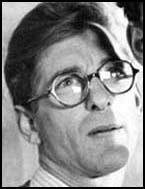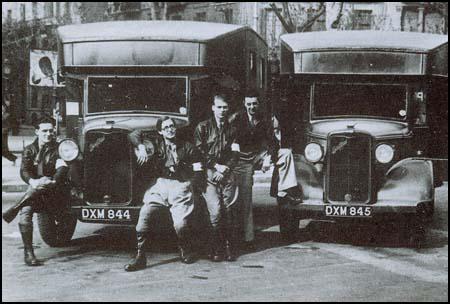John Boulting

John Boulting, the son of Arthur Boulting and Rose Bennet, was born in Bray, Berkshire, on 21st November, 1913. His twin brother was Roy Boulting.
The Boulting brothers went to Reading School where they became friends with Josh Francis and William Ball. According to the authors of We Cannot Park on Both Sides (2000): "Boulting appears at first sight to have been a model pupil - captain of the school's first fifteen at rugby, secretary of the Debating Society and Corporal in the Officer Training Corps."
John Boulting was fascinated with the cinema industry and in 1933 he joined Ace Films, a small film distribution company based in Wardour Street, London. He later described this period of his life as one of "selling bad films to reluctant exhibitors". Two years he found work with an independent film producer. He was also a socialist and a member of the Labour Party where he continued his friendship with Roy Poole, Josh Francis and William Ball.
On the outbreak of the Spanish Civil War it was decided to form a Spanish Medical Aid Committee. In his autobiography, All My Sins Remembered (1964), Peter Spencer, 2nd Viscount Churchill, explained what happened: "A group of us - three well-known medical men, a famous scientist, several trade unionists, and one communist - formed a committee for the purpose of collecting money for medical supplies to be sent to the Spanish Government forces." Boulting and his friend, Roy Poole, decided to volunteer to join this group, whereas Josh Francis and William Ball joined the International Brigades.
The First British Hospital was established by Kenneth Sinclair Loutit at Grañén near Huesca on the Aragon front. Boulting joined the group in January 1937. Other doctors, nurses and ambulance drivers at the hospital included Reginald Saxton, Alex Tudor-Hart, Archie Cochrane, Penny Phelps, Rosaleen Ross, Aileen Palmer, Peter Spencer, Patience Darton, Annie Murray, Julian Bell, Roy Poole, Richard Rees, Nan Green, Lillian Urmston, Thora Silverthorne and Agnes Hodgson.

Boulting was involved in the offences at Brunete and Belchite. His friend and fellow ambulance driver, Roy Poole, told the Reading Chronicle: "It's jolly hard work of course. Often you don't get more than five hours to your night. We have had as many as 150 cases to handle in a day. I reckon that I alone have driven my ambulance over 11,000 miles on truly villainous roads - not bad going in about three months. Before we arrived on the scene the wounded had to be dragged down from the mountains on mules."
On his return to England in November 1937 John and his brother Roy Boulting formed Charter Films. Their first film, was the documentary The Ripe Earth. With Roy directing and John producing, the company also put thrillers such as The Landlady (1938), Consider your Verdict (1938), Inquest (1939) and Trunk Crime (1939).
In 1940 John Boulding produced and co-wrote the anti-Nazi film, Pastor Hall. The story was based on the resistance of Pastor Martin Niemöller, played by Wilfred Lawson, who in 1933 had complained about the decision by Adolf Hitler to appoint Ludwig Muller, as the country's Reich Bishop of the Protestant Church. With the support of Karl Barth, a professor of theology at Bonn University, in May, 1934, a group of rebel pastors formed what became known as the Confessional Church. When the Nazi government continued with this policy Niemöller joined with Dietrich Bonhoffer to form the Pastors' Emergency League and published a major document opposing the religious policies of Hitler. As a result, both men were sent to concentration camps. Niemöller went to Dachau and Bonhoffer was sent to Buchenwald where he was executed in 1945.
After making this film John went into the Royal Air Force as a flight mechanic and Roy into the Royal Armoured Corps as a trooper. Later the twin brothers were transferred to their respective service film units, where they made wartime documentaries. They were granted special leave to return to Charter Films and produced the propaganda film The Dawn Guard (1941) for the Ministry of Information and the feature film Thunder Rock (1942). Promoted to the rank of flight lieutenant John Boulting directed the feature-length drama documentary Journey Together (1945).
Alan G. Burton has argued: "The Boultings' wartime cinema was progressive, moralistic, and strongly anti-fascist, with their films promoting the democratic ideals of the people's war and rejecting the discredited appeasement policy of the 1930s. Their achievements were widely recognized and they became identified with the renaissance in British cinema, which was felt to have attained a new maturity and honesty in confronting the national crisis."
After the war John Boulting directed the highly acclaimed Brighton Rock (1947), a film based on the novel by Graham Greene. He then produced Fame Is the Spur (1947), a film based on a novel by Howard Spring that deals with a left-wing politician who betrays his socialist beliefs. This was followed by producing The Guinea Pig (1948) and directing Seven Days to Noon (1950), a film about the possibility of nuclear war.
Boulting then changed direction and made a series of satirical comedy films such as Private's Progress (1956), Lucky Jim (1957), Brothers in Law (1957), Carlton-Browne of the F.O. (1959), I'm All Right Jack (1959), Heavens Above! (1963), The Family Way (1966) and There's a Girl in My Soup (1970). These films helped to make stars of Ian Carmichael, Richard Attenborough, Terry-Thomas and Peter Sellers.
John Boulting died on 17th June 1985 in Sunningdale, Berkshire.
Primary Sources
(1) The Reading Standard (18 December, 1937)
There are at present three Reading people in Spain helping with ambulance units in Madrid (Thora Silverthorne, Reginald Saxton and Roy Poole), and by the time this is published they will probably have been joined at the front by another of their townsmen (John Boulting).
He is Archibald Frank Francis, a 24-year-old insurance inspector, who suddenly threw up his job a week ago in order to help the Spanish Government in their defence of Madrid. He took this step after three weeks of careful thought during which only a few friends knew of his intentions.
He came to his decision after reading appeals in various newspapers for food and clothing to be sent to distressed civilians in Madrid... and when last heard of he was half way across the continent to join the International Brigade.
(2) Reginald Saxton, quoted in We Cannot Park on Both Sides (2000)
We've a very nice set of English chauffeurs with us. I should say English speaking there are also Americans and there was a Canadian. One of them John Boulting, who used to have long hair, states that he came to tea with you with Bill Ball before he left for Spain. In the last two battles our chauffeurs who have to go right up near the front line with their ambulances have had heavy casualties - 4 killed, 2 missing, I wounded, I seriously ill.

